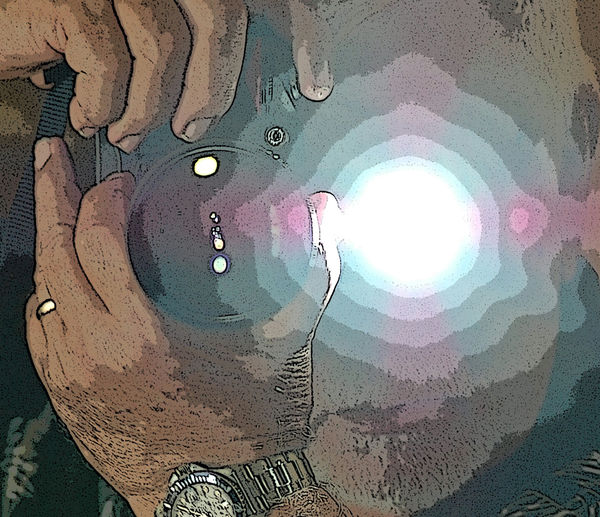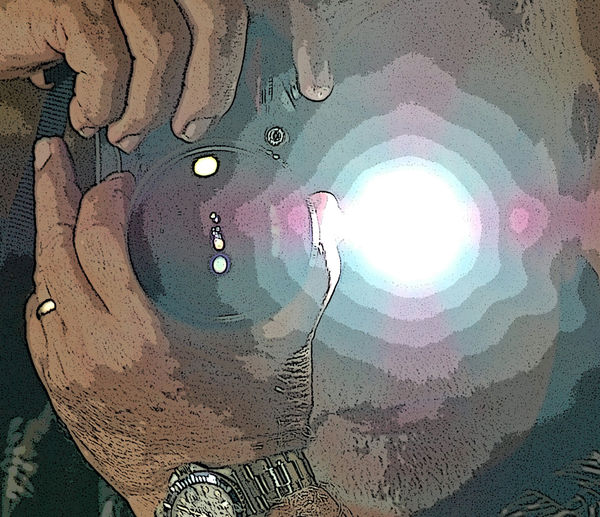UV Filters
Jun 20, 2014 08:31:39 #
+2... I too have been shooting for decades without the filters, although when I first started out I fell into the trap that they were needed. They will affect IQ, but depending on the filter itself & the scene being shot, you may not be able to see the difference. Where you will see it is when you are shooting a night scene, say a child blowing out the candles on a birthday cake in a darkened room. Or an outdoor night with light sources in the frame. You will get "ghost" images of the candle flame in the images due to reflections from the additional glass surfaces of the filter. Chances are you won't see them with most daytime shots. As for protecting the front element of the lens, it would take a lot of damage to make a difference in the image as light "bends" around defects in the glass (scratches et al) before it gets to the sensor. At most, there would be a loss of contrast. Better to protect your lens with the lens cap that comes with the lens when not actively shooting & the lens hood otherwise... Any fall will likely damage more than just the front element, particularly with modern lenses with the additional motors & chips in them
camerapapi wrote:
+ 1.
In my experience the best lens protector I have ever used has been a lens cap. UV filters are selling better than ever because of the tendency of many photographers to believe that it "protects" the surface of the lens.
I see no use for UV filters in my photography.
In my experience the best lens protector I have ever used has been a lens cap. UV filters are selling better than ever because of the tendency of many photographers to believe that it "protects" the surface of the lens.
I see no use for UV filters in my photography.
Jun 20, 2014 08:32:05 #
CHOLLY wrote:
I shoot the MAJORITY of the time in a marine envir... (show quote)
OK. So there is a huge mark up and profit involved in UV filters. That's not the issue. UV filters are, to some extent, a relic of the film camera era where the good filters did, in fact. have a positive impact on reducing haze in certain conditions. They do not perform this function on digital media because of the way those images are processed. A quality UV filter does not degrade the image to any discernible degree. Although they are not technically designed to protect the lens, they do offer some level of protection. Those who say otherwise are simply ignoring the laws of physics. An additional layer must, in fact, add some measure of protection, albeit small, to the lens. In some circumstances that small level might mean the difference between a scratched or damaged lens and one which avoids such issues. You decide whether that added peace of mind is worth the cost. I always use them and suggest the Hoya multicoated filters. In a test several years ago, they were selected to be best. Google best UV lens and read yourself.
Jun 20, 2014 09:09:39 #
Don, I can see that you have received a myriad of answers regarding your question about using filters and you've received just about as many different opinions about using them too :)
Here's my take on UV filters:
#1. B&H and Zeiss are among the best UV filters ~ as well as Hoya's top of the line are really good ones too.. These, I use on all my lenses except for extreme wide angle lenses because of vignetting. High quality filters do not reduce image quality, or, let's say, not enough that the human eye can detect. High quality UV filters transmit nearly 99+ % of light and image quality could only be argued if an image were to be magnified beyond any practical size ~ which none of us would ever attempt to approach anyway.
#2. These UV filters have 8 or more coatings; some of these filters are coated on both sides of the glass whereas they help reduce internal lens flare from unwanted light sources ~ such as whenever you cannot help from taking a photo with incoming direct, almost incoming direct sunlight, and strong reflections from glimmering objects.
#3. They protect your expensive camera lenses from dust, water droplets, other unwanted grunge, and they can be replaced when accidently scratched whereas replacing your camera lens would be far more costly.
#4. Post processing can sometimes produce image embellishment whereby the effects of a filter can be produced, but if you don't post process, I say, by all means use an UV filter !
Bottom line: If your UV filters are in excellent shape, carefully clean them and use them ! You cannot go wrong !
Enjoy your trip to Alaska and when you return, many of us would very much enjoy seeing some of your images !
~ Doug ~
Here's my take on UV filters:
#1. B&H and Zeiss are among the best UV filters ~ as well as Hoya's top of the line are really good ones too.. These, I use on all my lenses except for extreme wide angle lenses because of vignetting. High quality filters do not reduce image quality, or, let's say, not enough that the human eye can detect. High quality UV filters transmit nearly 99+ % of light and image quality could only be argued if an image were to be magnified beyond any practical size ~ which none of us would ever attempt to approach anyway.
#2. These UV filters have 8 or more coatings; some of these filters are coated on both sides of the glass whereas they help reduce internal lens flare from unwanted light sources ~ such as whenever you cannot help from taking a photo with incoming direct, almost incoming direct sunlight, and strong reflections from glimmering objects.
#3. They protect your expensive camera lenses from dust, water droplets, other unwanted grunge, and they can be replaced when accidently scratched whereas replacing your camera lens would be far more costly.
#4. Post processing can sometimes produce image embellishment whereby the effects of a filter can be produced, but if you don't post process, I say, by all means use an UV filter !
Bottom line: If your UV filters are in excellent shape, carefully clean them and use them ! You cannot go wrong !
Enjoy your trip to Alaska and when you return, many of us would very much enjoy seeing some of your images !
~ Doug ~
Jun 20, 2014 09:27:02 #
lighthouse wrote:
Contrary to CHOLLYs mad rantings
http://photographylife.com/filters-affect-resolution-lenses#more-59816
http://www.uglyhedgehog.com/t-144098-1.html
http://photographylife.com/filters-affect-resolution-lenses#more-59816
http://www.uglyhedgehog.com/t-144098-1.html
:thumbup: :thumbup: :thumbup: You must put a Good filter on a Good lens; don't buy a Good lens and put a cheap filter on it.
Jun 20, 2014 09:41:19 #
djenrette
Loc: Philadelphia
With a Nikon you can easily test the effect of a UV filter on your results. First, go into the menu and tell the camera to concentrate on getting the most resolution in jpg. Then take a few pix of the same scene (use a tripod) with and without uv filer and go into EXIF data. If both photos have the same file size (or close to it), then it doesn't have any significant effect on your photos. And if it makes you feel safer, use UV filters.
Also, even if it does make a difference, it may not matter. A local camera club takes its submissions on line and then projects them. The maximum size for submission is 1024 pixels on the longest side, which make each photo size just about 1 mp or less. Which means they might just as well be using the oldest, most out-of-date call phone cameras! And yet this crowd swears by their D800 cameras!
I never use uv filters, (My first Leica M3 was bought in RAF Station Sculthorpe for $166 in 1956 and no scratches or lens damage since that a uv filter could have prevented) but I do like rubber lens hoods -- they give good protection as you casually swing through an open doorway with camera dangling on shoulder.
Also, even if it does make a difference, it may not matter. A local camera club takes its submissions on line and then projects them. The maximum size for submission is 1024 pixels on the longest side, which make each photo size just about 1 mp or less. Which means they might just as well be using the oldest, most out-of-date call phone cameras! And yet this crowd swears by their D800 cameras!
I never use uv filters, (My first Leica M3 was bought in RAF Station Sculthorpe for $166 in 1956 and no scratches or lens damage since that a uv filter could have prevented) but I do like rubber lens hoods -- they give good protection as you casually swing through an open doorway with camera dangling on shoulder.
boo

Jun 20, 2014 09:41:27 #
djenrette
Loc: Philadelphia
With a Nikon you can easily test the effect of a UV filter on your results. First, go into the menu and tell the camera to concentrate on getting the most resolution in jpg. Then take a few pix of the same scene (use a tripod) with and without uv filer and go into EXIF data. If both photos have the same file size (or close to it), then it doesn't have any significant effect on your photos. And if it makes you feel safer, use UV filters.
Also, even if it does make a difference, it may not matter. A local camera club takes its submissions on line and then projects them. The maximum size for submission is 1024 pixels on the longest side, which make each photo size just about 1 mp or less. Which means they might just as well be using the oldest, most out-of-date call phone cameras! And yet this crowd swears by their D800 cameras!
I never use uv filters, (My first Leica M3 was bought in RAF Station Sculthorpe for $166 in 1956 and no scratches or lens damage since that a uv filter could have prevented) but I do like rubber lens hoods -- they give good protection as you casually swing through an open doorway with camera dangling on shoulder.
Also, even if it does make a difference, it may not matter. A local camera club takes its submissions on line and then projects them. The maximum size for submission is 1024 pixels on the longest side, which make each photo size just about 1 mp or less. Which means they might just as well be using the oldest, most out-of-date call phone cameras! And yet this crowd swears by their D800 cameras!
I never use uv filters, (My first Leica M3 was bought in RAF Station Sculthorpe for $166 in 1956 and no scratches or lens damage since that a uv filter could have prevented) but I do like rubber lens hoods -- they give good protection as you casually swing through an open doorway with camera dangling on shoulder.
boo

Jun 20, 2014 09:43:01 #
lighthouse wrote:
Bkyser, CHOLLY, anyone at all,
feel free to take a look at the comparison photos in this thread and tell me which ones have the filters on them and tell me what leads you to decide that.
feel free to take a look at the comparison photos in this thread and tell me which ones have the filters on them and tell me what leads you to decide that.
You can't see the loss on a monitor. The resolution is too low. The comparison is more easily noticed on highly cropped print.
Jun 20, 2014 09:58:24 #
djenrette wrote:
With a Nikon you can easily test the effect of a U... (show quote)
Isn't it odd that some people who have never damaged a lens would recommend against using UV filters? I guess that means since my house has never been broken into, I should no longer lock the doors and windows. Geesus. Thanks a lot for that unassailable logic.
Jun 20, 2014 10:00:25 #
ricardo7
Loc: Washington, DC - Santiago, Chile
CHOLLY wrote:
I shoot the MAJORITY of the time in a marine envir... (show quote)
I wonder if you would post some side-by-side photographs demonstrating the degradation of image quality due to a UV filter.
Jun 20, 2014 10:10:01 #
ricardo7 wrote:
I wonder if you would post some side-by-side photographs demonstrating the degradation of image quality due to a UV filter.
I second that request and would be willing to wager that with a quality filter, there will be no discernible image degradation. When I use the word discernible, I mean when viewed under normal conditions. If magnified to some extreme degree, one might perhaps notice a nominal difference at best.
Jun 20, 2014 10:14:44 #
Tiny focusing errors or camera movement have a much greater effect on image sharpness than a decent filter. Look at my comparison photos at 100% with a cheap filter. How much real difference do you see?
Jun 20, 2014 10:17:25 #
Regarding Viviter filters if you check out filters at a good online store, B+H, Adorama for example, you will find that Vivitar filters are at the bottom price range. I would suggest that you use them as "lens caps" and remove them when you shoot. I have Hoya filters and I don't notice any appreciable loss in image quality. There is a grain of truth in you get what you pay for.
Jun 20, 2014 10:21:37 #
alandg46 wrote:
You can't see the loss on a monitor. The resolution is too low. The comparison is more easily noticed on highly cropped print.
I couldn't tell the difference on a 50" high def tv, is that enough resolution?
Jun 20, 2014 10:23:02 #
Bottom line here folks is that if it makes you feel better protected, then use one, otherwise don't... Senseless to argue over this. The only real argument is that if you are going to use a "protective" filter, don't use a UV filter, use a multicoated clear glass filter instead...As has been noted, they do affect the image (after all there are 2 more glass surfaces added that are not a part of the original optical formula) but, that said & as I said previously, those effects are not going to be easily discernible the way most people are going to be viewing their output, (meaning on a monitor)except in certain scenarios...
Jun 20, 2014 10:25:25 #
Video or monitor resolution won't show effects as readily as if you made say, a large 20" x 30" print...
mechengvic wrote:
I couldn't tell the difference on a 50" high def tv, is that enough resolution?
If you want to reply, then register here. Registration is free and your account is created instantly, so you can post right away.







